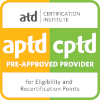Product Details
Topics Covered
- Compensation and organizational goals
- Components of a compensation system
- Challenges in designing compensation systems
- Job pricing
- Pay grades and benchmarking
- Tools for market pricing
- Compensation management
- Pay for performance
- Commissions
- Ethical concerns about compensation
- Compensation and equity
- Equity issues in compensation
- Compensation and the law
- Independent contractors
- Compensation and remote and hybrid environments
- Executive compensation
Key Features
- Mobile-friendly
- Audio-enabled
- Badge and credit-awarding
- Real-world case studies
- Fully accessible
- Games & Flashcards
- Expert-supported
- Video content
Course Preview
Course Description
Learning Outcomes
- Identify components of a compensation system
- Analyze the role of compensation as part of a rewards system
- Describe how jobs are priced
- Explain how executive compensation drives performance
- Describe the role of compensation professionals in overseeing compensation-related functions
- Explain how to design a compensation system that supports an organization's current workforce and attracts talent needed to achieve strategic goals
- Examine strategies for creating compensation packages in hybrid and remote work settings
- Identify and address ethical concerns around compensation
Notes
This course has an "Ask the Expert" feature, which submits your questions directly to an expert in the field you are studying. Questions are answered as quickly as possible and usually within 24 hours.
As an Accredited Provider, MindEdge offers for its learning events that comply with the Continuing Education and Training Standard.
Learners must achieve an average test score of at least 70% to meet the minimum successful completion requirement and qualify to receive credit. Learners will have three attempts at all graded assessments.



